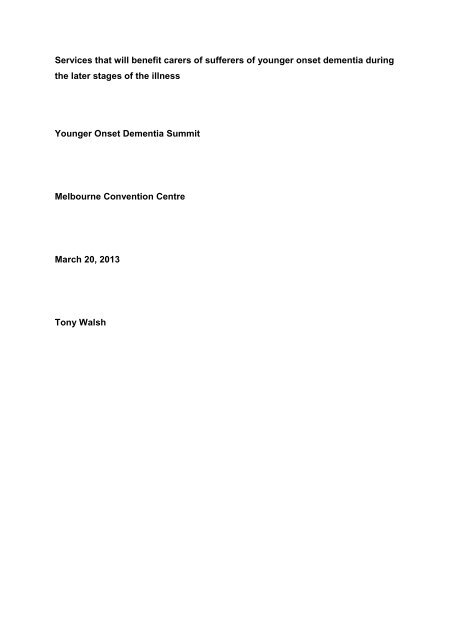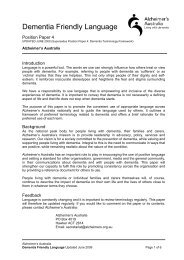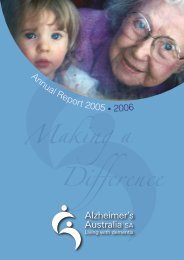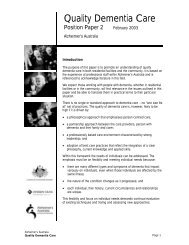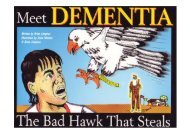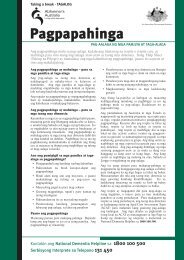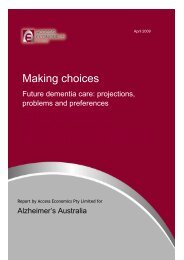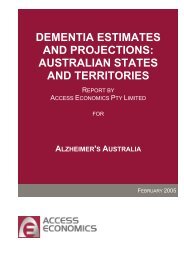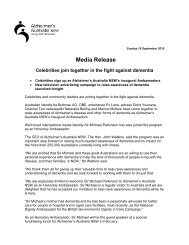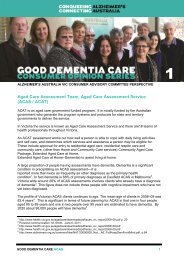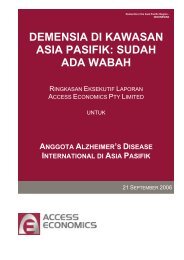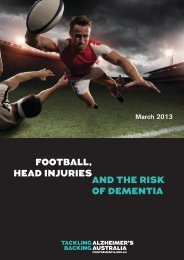Services that will benefit carers of sufferers of younger onset ...
Services that will benefit carers of sufferers of younger onset ...
Services that will benefit carers of sufferers of younger onset ...
Create successful ePaper yourself
Turn your PDF publications into a flip-book with our unique Google optimized e-Paper software.
I have been asked to speak to you today about services <strong>that</strong> <strong>will</strong> <strong>benefit</strong> <strong>carers</strong> <strong>of</strong><strong>sufferers</strong> <strong>of</strong> <strong>younger</strong> <strong>onset</strong> dementia during the later stages <strong>of</strong> the illness. I havebased my talk on <strong>that</strong> which I have learned as Chairman <strong>of</strong> the Younger OnsetReference Group in Victoria and from people in similar situations I have met on thisjourney.Just a bit <strong>of</strong> my historyI can remember the exact moment <strong>that</strong> my partner told me in 2003 <strong>that</strong> he had beenreferred to a memory clinic by our GP. I remember thinking what a load <strong>of</strong> nonsense.A few months later I also remember sitting in on a consultation with a specialist and itdawning on me <strong>that</strong> yes there is a problem and I had taken over at home withoutrealising it. It was at this point I knew the issues had become difficult at work and <strong>that</strong>is why he had sought the referral.The next moment I remember was in 2006 when a psychiatrist diagnosedAlzheimer's disease. I noticed a tremor in his arm in 2007 and Parkinson's wasadded to the diagnosis. It was not until 2011 <strong>that</strong> he began to hallucinate and hadvery exciting delusions <strong>that</strong> the final diagnosis <strong>of</strong> Lewy Bodies Dementia was made.This <strong>will</strong> be a familiar story for many <strong>of</strong> you - we attended the Alzheimer's AustraliaLiving With Memory Loss course and made friends with seven other couples whohave remained in regular social contact since; a valuable resource to have duringthis journey. I also attended another course, this time aimed at the <strong>carers</strong> <strong>of</strong> peoplewith <strong>younger</strong> <strong>onset</strong> dementia. During this early part <strong>of</strong> the journey I must say theeducation available was excellent and the resulting collection <strong>of</strong> pens, we got a newone at each session, was impressive.A few more years passed whilst we continued to see the world before it was too late.We completed 15 cruises before 2011 when Paul deteriorated quickly and had to bemoved into care. Although I had to select quickly I think I did it well and both Pauland I are very happy with the care being provided. Suddenly this person who I livedwith for 22 years who since his retirement was my constant companion for 5 yearswas no longer in this big house. What was worse, I realised <strong>that</strong> I had not fully takenin the information <strong>that</strong> had been so expertly provided in the early years. Looking
is the main cause <strong>of</strong> the low visitor rate to people in dementia units. The behaviouralissues <strong>of</strong> other residents probably also play a part.Another told me, “Hardly anyone <strong>of</strong> my husband's friends visit and they all livearound the corner. They tell me they want to visit but they never do. Some say theywant to remember him the way he was. Some have visited once and never again. Ithink it is too confronting for them coming face to face with the reality <strong>of</strong> the situationand seeing all the other older residents.”In the same vein someone else said, "There were 450 people at my partner’sfuneral...only one friend had visited him (twice) in the 11 weeks <strong>that</strong> he was in care. Ithink people are afraid to face the reality <strong>of</strong> later stage dementia. It is confronting forus, especially when <strong>younger</strong> people like our partners are placed among much olderresidents. So no wonder it’s even more confronting for our children, grandchildrenand friends.And now what to do about itI think there are three groups <strong>of</strong> people <strong>that</strong> need help:The carerfamily and friendsthe staff at the facility.Let's start with the facility. I am told <strong>that</strong> the more people who visit the happier theresident. I also observe this to be the case. The happier the resident, the happier thestaff and the less pressure they are under. So let's get people visiting more <strong>of</strong>ten.As a first step I think we need to understand <strong>that</strong> visiting a dementia wing is welloutside the comfort zone <strong>of</strong> most people. We need to provide help to those who wishto visit and tell them about the how, when and where to visit. It is a matter <strong>of</strong>education. It's a bit like helping people to overcome the fear <strong>of</strong> flying. You have to doit before they take <strong>of</strong>f in a less confronting environment.How to visit includes signing in, knowing the staff and knowing who has whatresponsibility, how to react to the other residents and how to deal with difficultsituations. It also includes knowing how to plan the visit, do you need to come


